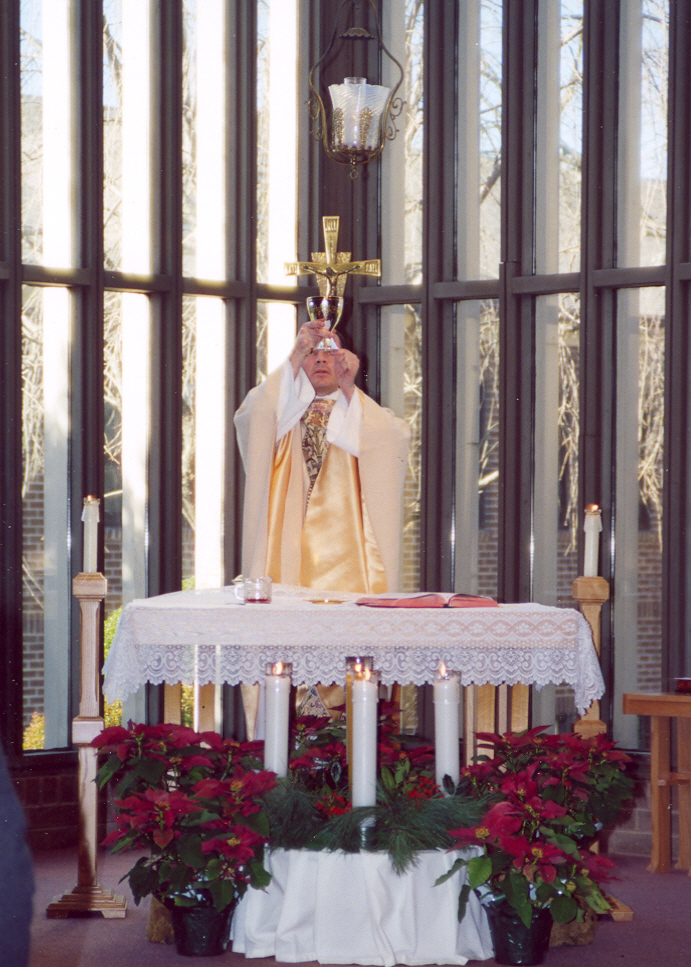
Return to
Index The Catholic Faith
Return to Level
Two Topic Index
Home Page
Jesus Christ, through whom all good things come to us, died on Calvary and rose again from the dead. His sacrifice redeemed the human race. Every day that sacrifice is renewed in the Holy Mass. That is what the Mass is all about. The Mass is the same sacrifice as the sacrifice at Calvary; it not only recalls that sacrifice but continues it.
Jesus gave us the precious gift of the Eucharist for two reasons: so that we might have eternal life and so that we might have an acceptable sacrifice to offer continually to the Father. As Frank Sheed expressed it, "The Mass is Calvary, as Christ now offers it to his Father." The Victim offered is the same - Jesus himself. He is present as he made himself present under the appearances of bread and wine at the Last Supper. The Priest is one and the same; for the priest at our altar acts in the person of Jesus to change the bread and wine into the Body and Blood of the Lord.

The difference between the sacrifice of the Cross and that of the Mass is the way in which it is carried out. On the Cross Jesus offered himself, shedding his Blood for our redemption. On the altar Jesus is offered through the ministry of the priest without shedding his Blood again.
A Memorial
Besides being a sacrifice, the Mass is a memorial by which until the end of time we call to mind the death of Christ. Christ said to his apostles, "Do this in memory of me." He did not mean, however, that the Mass would be only a memorial. In the Mass we not only remember Christ's death on the Cross, but Christ brings his sacrifice before us in a real though sacramental way. Mass is a memorial of Christ's Resurrection as well. The Church teaches that it is "a memorial of his death and Resurrection." Here, too, the reality is more than a recollection. For the Chief Priest at Mass is the Risen Christ who is present in the Eucharist.
The Four Ends of Mass
Holy Mass is the perfect prayer. So it has the same ends, or purposes, as prayer.
1. The Mass is an act of supreme worship; it is Christ's greatest gift to his Church. Men with nothing worthy to offer God have now been given a Victim and a sacrifice of infinite value.
2. The Mass is a prayer of thanksgiving; the word "eucharist" actually means "thanksgiving." We have so much to thank God for: our lives, with all that they contain of family and friends, people, places, and things. Most of all, there is the supernatural life of grace given to us by Jesus Christ, Our Savior. It is through the life of grace that we have hope of reaching Heaven and can enjoy great happiness even now.
Through the Mass we have the chance to thank God for all his benefits, most of all for his generosity and mercy in sending us Jesus, his Son. And it is Jesus, his gift to us, whom we now offer back to him. God is infinitely pleased with this gift that he has put in our hands.
3. The Mass is a means of making satisfaction for sins. We pray: "Lamb of God, you take away the sins of the world, have mercy on us . . . grant us peace." Are we asking Jesus to do something that he has already done? Are we asking him to take away the sins of the world again and again, every time the Mass is offered?
No; there is really only one Mass, and it was offered on Calvary. And it is this one Mass that is offered on all our altars. Through the gift of the Mass, Jesus has extended his sacrifice in time and space. Our participation at Mass is our time to be with Christ at the Cross.
4. The Mass is our best means of petitioning the Father and obtaining the graces we ask both for ourselves and for others. In the Mass we are offering to God the perfect sacrifice, the most pleasing offering we have to give, and God will be pleased by our offering so great a gift.
Used with the permission of The Ignatius Press 800-799-5534
Return to
Index The Catholic Faith
Return to Level
Two Topic Index
Top
Home Page